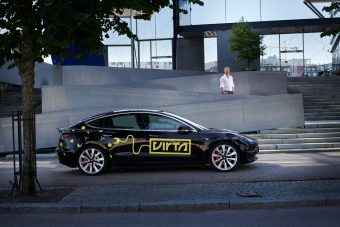
Elias Pöyry is the Co-Founder & CBO of Europe’s fastest-growing electric vehicle charging company Virta. Since the company has also been present at our market as a partner in charge&GO – the first regional EV charging network, we asked Pöyry to give us insights on key trends that will change the market in the coming years and advice on how to prepare infrastructure for an EV future.
EP: Could you tell us about Virta and its mission?
Elias Pöyry: Already in 2013, Virta CEO Jussi Palola and i understood that the future of mobility is electric. We founded Virta with a vision to integrate electric mobility, energy system and digital sectors into one ecosystem. Virta is an independent platform that integrates chargers from different owners to enable the best user experience through interoperability and the most cost-ef- ficient way to handle payments and clearing. We grow fast: five times faster than the market average. The main reason for our rapid growth is the right partners. MT-KOMEX is a great example of this. Another example from Europe is E.ON. In Asia, Virta has partnered with Japan’s largest energy company ENEOS. We are currently expanding our reseller network.
Our solutions have been built to support electric vehicle charging infrastructure anywhere globally, and we have hundreds of professional charging network customers in Europe. Today our digital platform connects all the key players in the electric vehicle ecosystem and provides the whole value chain services. Virta operates in over 30 countries worldwide from French Caribbean to Finland – and in Serbia with MT-KOMEX.
EP: Why electric vehicles are the most important source of flexibility in the energy system?
Elias Pöyry: As you know, renewables cause volatility to our energy systems. They require flexibility, and demand response elements to keep the system stable, reliable, and reasonably priced. That’s where electric vehicles come in. According to the International Energy Agency, EVs can provide a critical source of flexibility in our energy system; in fact, they are big batteries on wheels. EVs are the most cost-efficient batteries and energy storages in the energy system because they come with zero incremental costs. They also come with zero infra costs because the charging network is already there. They also run with zero maintenance and operations costs because the operation costs are already taken care of by the EV drivers and charging operators.
In focus:
EP: What are the key trends in the e-mobility world at the moment?

Elias Pöyry: The EV charging market in 2025 will look very different from today – both in the Western Balkan region and all over Europe. I would highlight four trends that will change the market in the coming years: partnership, brands, end-to-end and energy management.
The number one prerequisite for a profitable charging business is very traditional: location. Volumes, in turn, drive scale benefits and transaction efficiency. But partnerships are just as important. Valuable and carefully chosen partners and externalizing platform costs are the keys to success. Partnerships enable both parties to focus on what they do best and the end-user benefits, too.
The brand trend is another big one. People want to do business with familiar brands, for example, charge their electric vehicle at the NIS Gazprom Neft station. And on the other hand, the companies and property owners want their brand to be related to EV charging. That goes well beyond adding the company’s logo sticker to the charging station. It means full brand experience – from loyalty programs onwards.
The integrated end-to-end digital value chain is also a big trend. It means that anyone who wants to manage the best user experience or the best value for charging networks must understand and manage the entire value chain, end-to-end: From the customer journey to the hardware journey and from maintenance to operations and to customer experience.
The energy management trend is already in full motion. And no wonder energy management brings direct benefits in the form of saving costs. Electric vehicle charging often requires electrical upgrades, which means an increase in fixed and monthly energy costs. Smart charging solutions can alleviate many of those energy-related costs while helping futureproof businesses. All smart EV chargers can adapt to this and become active players in the energy flexibility markets.
Inteview by: Nevena Đukić
Read the whole interview in the new issue of the Energy portal Magazine CIRCULAR ECONOMY, march 2021 – may 2021.

